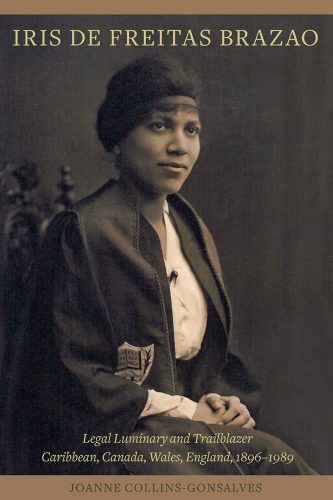 The book Iris de Freitas Brazao, Legal Luminary and Trailblazer: Caribbean, Canada, Wales, England 1896-1989 was the winner of the Third Prize in the Guyana Prize for Non-Fiction 2023. The author is Joanne Collins-Gonzalves, a Guyanese historical scholar who used to be at the University of Guyana but is now Managing Director of Historical Research International Inc. in Alberta, Canada, as well as Research Fellow at the Farquharson Institute of Public Affairs in Jamaica, among a number of other positions.
The book Iris de Freitas Brazao, Legal Luminary and Trailblazer: Caribbean, Canada, Wales, England 1896-1989 was the winner of the Third Prize in the Guyana Prize for Non-Fiction 2023. The author is Joanne Collins-Gonzalves, a Guyanese historical scholar who used to be at the University of Guyana but is now Managing Director of Historical Research International Inc. in Alberta, Canada, as well as Research Fellow at the Farquharson Institute of Public Affairs in Jamaica, among a number of other positions.
It was recently announced that the book had more high honours conferred upon it in the UK. It has been featured by the University of London, Senate House Library as one of the “three fascinating items from the collections” of 312,000 volumes within the holdings of the Institute of Advanced Legal Studies (IALS) Library.
 This week we are pleased to print a review of this work written by Clare Cowling, IALS Archivist (see below). The book along with an academic record on Iris de Freitas Brazao were highlighted as part of a series of events to commemorate the 30th Anniversary of the School of Advanced Study, which was formed in 1994. The Senate House Library’s post noted that “the IALS Library has grown into a nationally important legal research collection – both in the UK and internationally. With over 312,000 volumes, its collections of foreign and international law are the most extensive in the UK and contain much unique material.” The other items highlighted included in the Senate House Library’s post were “An ordinance for abolishing of festivals – 8 June 1647”, as well as the Laws and ordinances, relating especially to Heligoland from the 19th century. The book was showcased across the University of London Senate House Library’s major social media pages on June 25-26, 2024.
This week we are pleased to print a review of this work written by Clare Cowling, IALS Archivist (see below). The book along with an academic record on Iris de Freitas Brazao were highlighted as part of a series of events to commemorate the 30th Anniversary of the School of Advanced Study, which was formed in 1994. The Senate House Library’s post noted that “the IALS Library has grown into a nationally important legal research collection – both in the UK and internationally. With over 312,000 volumes, its collections of foreign and international law are the most extensive in the UK and contain much unique material.” The other items highlighted included in the Senate House Library’s post were “An ordinance for abolishing of festivals – 8 June 1647”, as well as the Laws and ordinances, relating especially to Heligoland from the 19th century. The book was showcased across the University of London Senate House Library’s major social media pages on June 25-26, 2024.
Joanne Collins further advises us that “In addition to Iris being the first female Barrister-at-law in the Commonwealth Caribbean, she was also the first woman in Guyana to prosecute a murder trial in 1932 – sixteen (16) years before Helena Normanton led the prosecution of the first murder trial by a woman Barrister-at-Law in England in 1948.”
Collins-Gonzalves declares “I am deeply honored that my book on Iris de Freitas Brazao was featured, and I am very pleased that Iris’ contributions to the legal community are being recognised.
REVIEW: Joanne Collins – Gonzalves,
Iris de Freitas Brazao, Legal Luminary and Trailblazer: Caribbean, Canada, Wales, England 1896-1989
By Clare Cowling
What a pleasure it has been to review this beautifully written and meticulously researched account of the life of the first woman to be called to the bar in the Common-wealth Caribbean as well as being the first Caribbean woman to be called to the English Bar. It is an uplifting account of how a single woman overcame the contemporary and multiple obstacles of being illegitimate, female, mixed race and a colonial though sheer diligence and hard work.
Iris’s personal life makes for fascinating reading as delineated by the author; born in Barbados in 1896, with a Portuguese father and Barbadian mother, Iris’s parents never married but Iris and her family were supported by her father, who was also a firm believer in the education of girls and encouraged her to undertake higher education. This she did; between 1918 and 1929 she attended law schools in Canada, Wales and England, earning four degrees and culminating in being called to the Bar in 1929.
Iris was brought up in British Guiana; the author provides a useful analysis of the historical context behind Iris’s achievements, especially in relation to the legacy of slavery and colonialism in British Guiana and the extension of education, including legal studies, to the local population and the Caribbean in general. Following her call to the Bar in 1929 Iris returned to British Guiana to practise law, becoming the country’s first female prosecutor and the first woman to prosecute a murder trial. She also served on several public bodies. During this time she somehow found the time to marry and encountered yet another obstacle: the hostile attitude of so many institutions to married women working and – horror of horrors – retaining their maiden name professionally. The author provides some riveting contemporary material documenting this issue; it will not surprise the reader that Iris triumphantly overcame all opposition and continued to work, travel and undertake further public service. She died in 1989 at the age of ninety-two, much lauded by her peers.
As an archivist, I was fascinated to read the author’s account of how she discovered and delved into the scattered records providing evidence of both Iris’s private and professional life and the historical context to her achievements. As an Australian woman with convict ancestry, I was able to identify to some extent with the many details provided by the author of Iris’s struggles against institutionalised sexism and patronising attitudes to colonials in the twentieth century, though I was fortunate not to encounter the systemic racism with which Iris had to contend. This book provides several eye-opening accounts of how Iris had to fight sexual and racial discrimination, much of which was institutionally embedded.
This is a very timely book, given current discussions about decolonisation and the legacy of the British Commonwealth, plus of course the ever-present need for new material demonstrating how hard women – especially women of colour – have had, and must continue, to fight to shatter the twin glass ceilings of misogyny and racism. We must never forget that what can be achieved can also be taken away in the blink of a political/cultural eye. That is one reason why this book is important. The other (with my archivist hat on) is the understanding that unless accurate documentation of the past is preserved and published the present can never be fully understood.
Oh and by the way, it’s a really good read!









